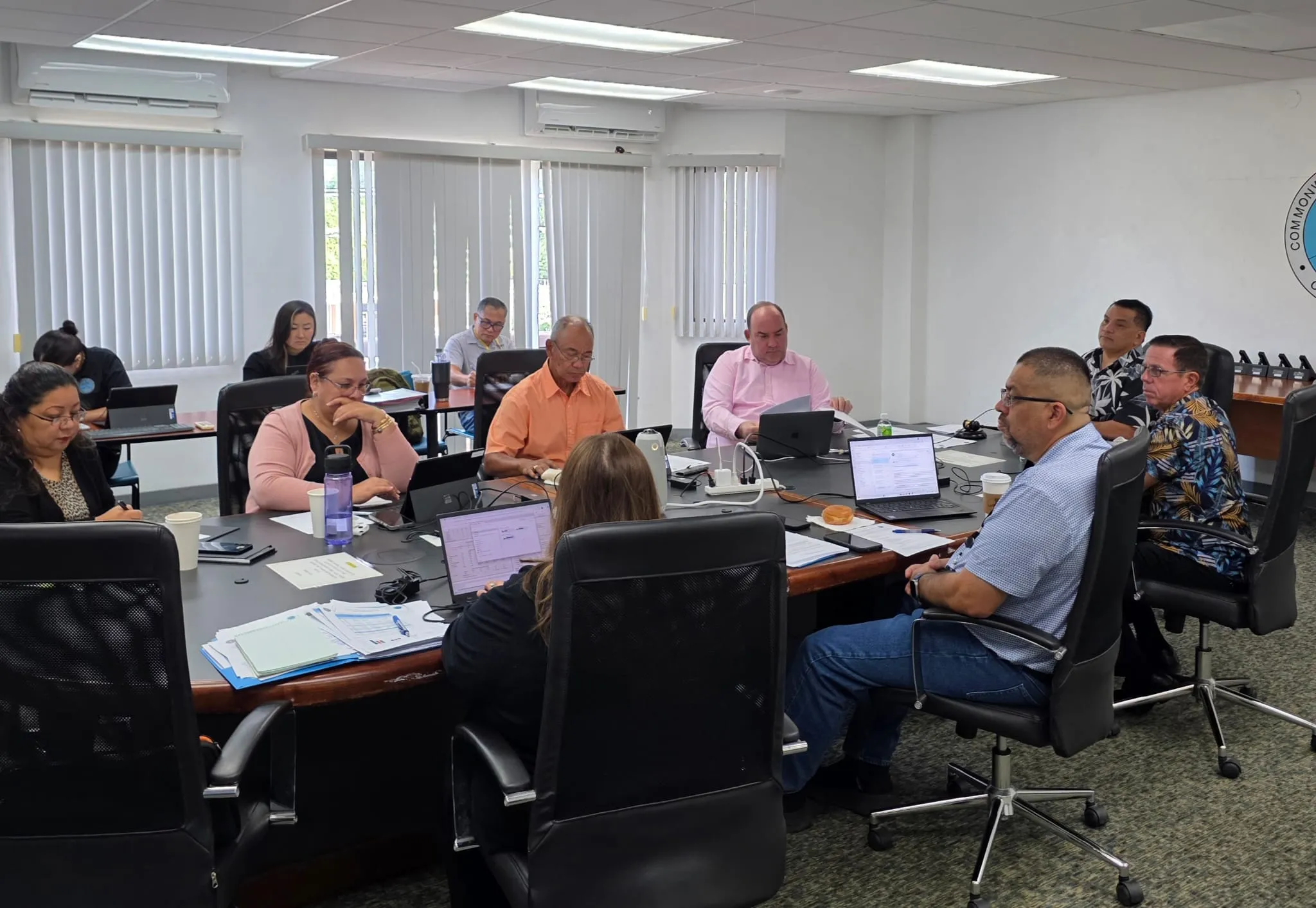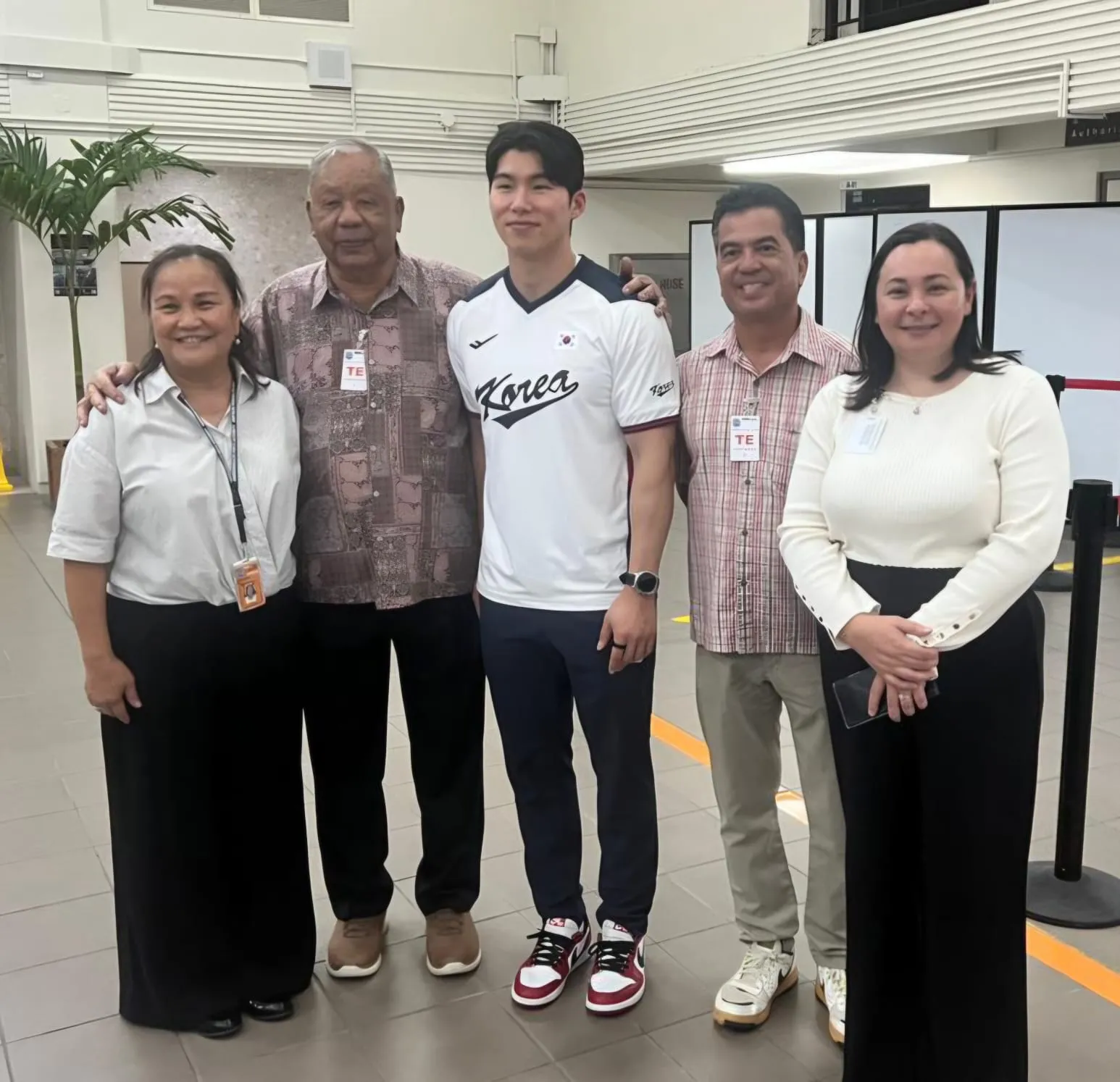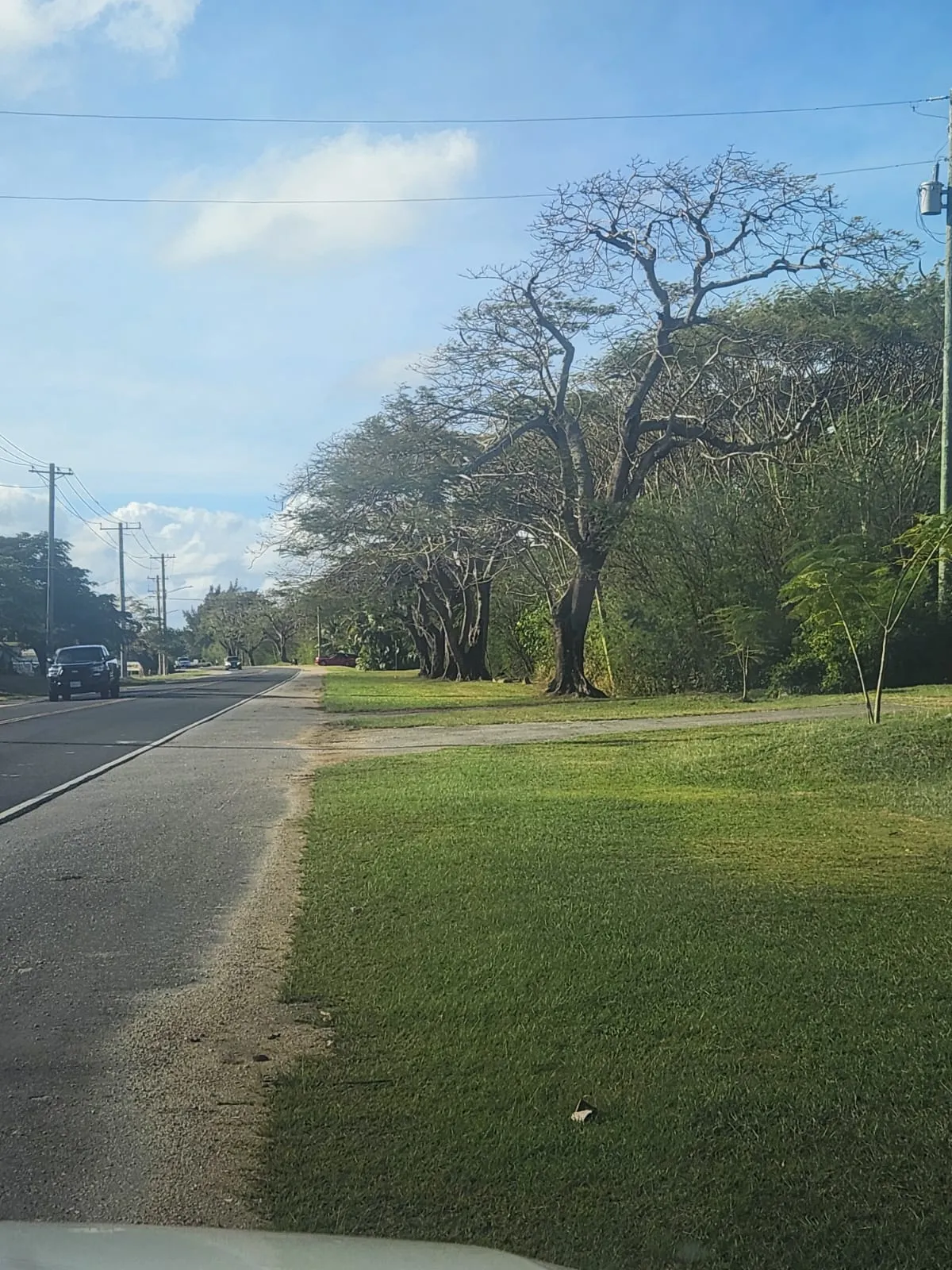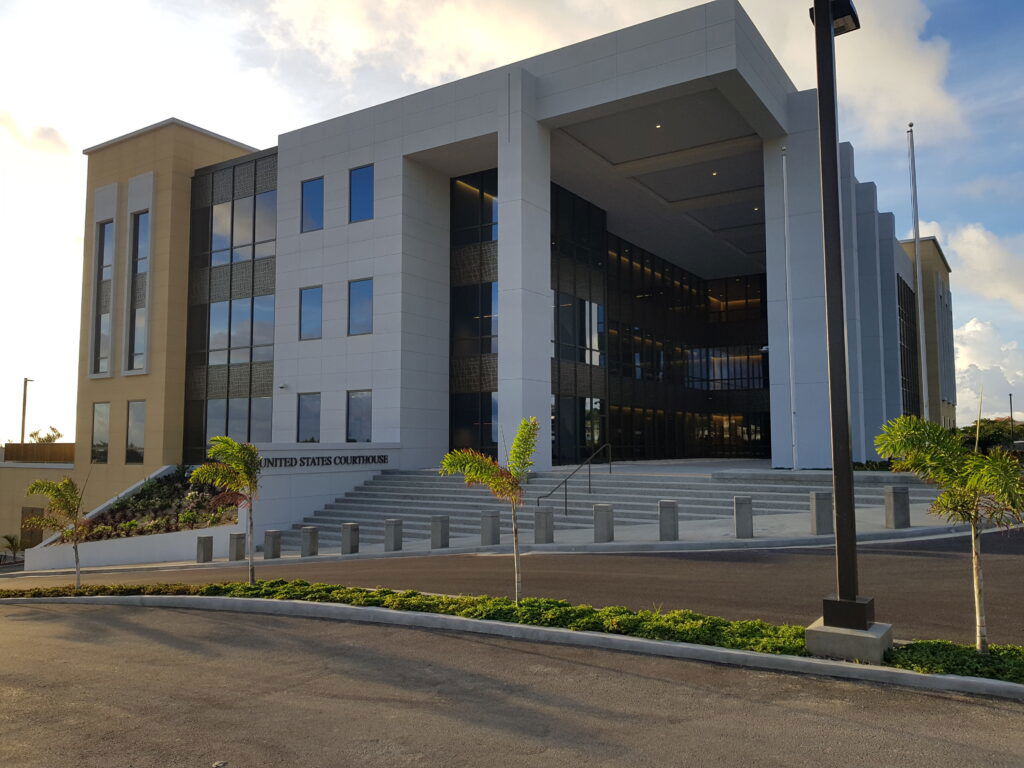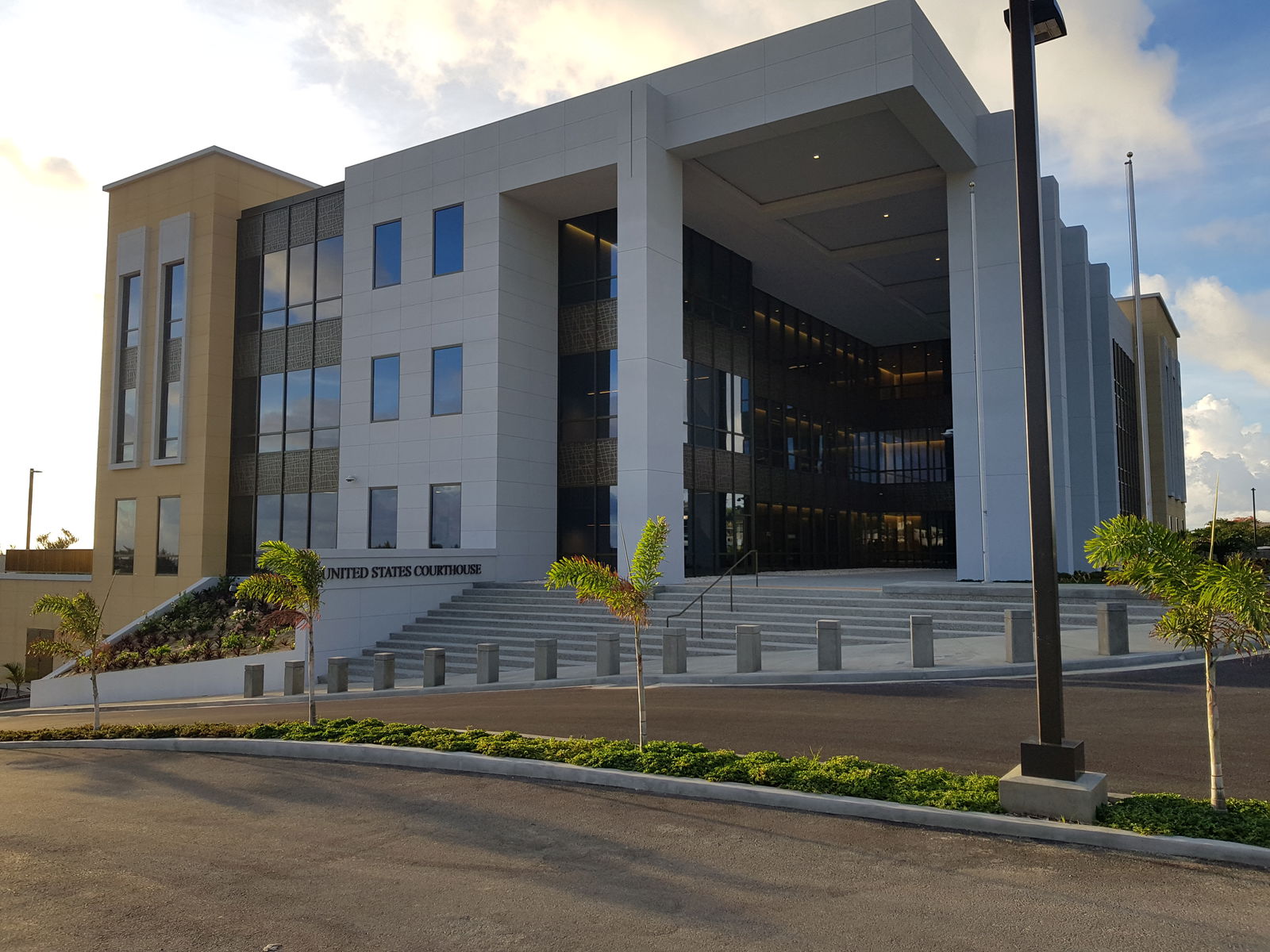
The United States Courthouse in Gualo Rai, Saipan.
FOR failing to file a second amended complaint and not requesting an extension to the court-ordered deadline of March 20, 2025, the federal court has closed Zaji Zajradhara’s $100 million lawsuit against Northern Marianas College.
Chief Deputy Clerk William J. Bezzant signed and issued the judgment on March 21, 2025.
Previously, Designated Judge Frances Tydingco-Gatewood ordered the District Court for the NMI clerk to enter a final judgment and close the case on March 20, “unless Zajradhara files a proper motion for reconsideration pursuant to the Federal Rules of Civil Procedure.”
Zajradhara had not filed any motion after the court dismissed the case with prejudice on March 6.
The judge denied Zajradhara’s request for the court to certify its order denying his motions for stay.
He sought certification of the following question for interlocutory appeal:
“Does the CNMI’s unique exemption from the full application of the Fourteenth Amendment violate the Equal Protection and Due Process Clauses, thereby inflicting direct harm on Plaintiff Zaji O. Zajradhara and similarly situated citizens, and warrant a stay of proceedings pending resolution of executive and legislative actions explicitly addressing this constitutional anomaly, including H.R. 569, and given demonstrable indications of judicial bias and inconsistent application of law…?”
According to the judge, Zajradhara failed to demonstrate that the requirements for an interlocutory appeal had been met.
“The controlling question of law at issue in the Order Denying Motions for Stay was whether pending legislation justifies staying proceedings, not the scope of the application of the Fourteenth Amendment to the CNMI,” Judge Tydingco-Gatewood said.
“Zajradhara has not sufficiently established that there is any ground for difference of opinion as to the relevant controlling question of law. Further, appealing the Order would not advance the ultimate termination of litigation; Zajradhara’s deadline to file his second amended complaint has already passed,” the judge added.
The court dismissed the complaint “for failure to comply with the court’s orders setting and extending the deadline for filing a second amended complaint.”
The court said it has “already extended the deadline for Zajradhara to file an amended complaint and suggested that he file a second motion for an extension if he so needed — which he has not done. Instead, Zajradhara has spent his time litigating his request to stay proceedings in this matter.”
Judge Tydingco-Gatewood said this “action cannot proceed without an amended complaint, and Zajradhara has neither filed one nor requested an extension by the court-ordered deadline.”
Earlier, Zajradhara filed two motions for stay of proceedings after the federal court dismissed — with leave to amend — his first amended complaint in December 2024.
Zajradhara, who represents himself, requested a stay of the proceedings while he is “pursuing critical legislative remedies directly relevant to the underlying issues of this case.”
He said he was awaiting a response from U.S. House Oversight Committee Chair James Comer, the White House, the U.S. Department of Justice, and other relevant federal governmental entities regarding the letter he sent proposing amendments to the CNMI’s exclusion from various provisions of the 14th Amendment.
On Feb. 18, 2025, Judge Tydingco-Gatewood denied his motion for stay, saying it was “bereft of citation to any authority which would authorize a stay under these circumstances, [and they are] bereft of common sense.”
Citing prior rulings, she said: “If courts were to stay action every time new legislation was introduced, the judicial system would grind to a halt.”
“Here,” she added, “there is not even pending legislation to support Zajradhara’s motions to stay proceedings; Zajradhara has merely sent a letter to a Congressional representative, the White House, and the Office of the United States Attorney General.”
In his first amended complaint against NMC, Zajradhara named NMC President Galvin Guerrero, NMC-SBDC Network Director Nadine Guerrero, U.S. Small Business Administration’s Guam Branch Manager Ken Lujan, and three Doe defendants “who, at the time of the incident, may or may not have been employees or agents” of NMC, [the Small Business Development Center] or the CNMI government and acted under color of state law.”
Zajradhara alleged civil rights violations, saying he was denied access to federally funded programs, which caused public humiliation, mental anguish, pain and suffering. He also alleged false allegations/slander, attempted false arrest, extortionist threats, and retaliation.
Zajradhara demanded $100 million in damages for “loss of business opportunities, reputational harm, emotional distress, public harassment, threats of false arrest, and the deprivation of his access to federally funded programs and services.”
In his complaint, Zajradhara said he is a small business owner and program director of a local nonprofit, who, since 2019, has been seeking assistance from the CNMI-SBA STEP Program and the NMC- SBA SBDC Program.
He said he was discriminated against and denied access to both of these federally funded programs, adding that “this discrimination stemmed from personal conflicts and biases held by defendants, rather than any legitimate business reasons.”
Zajradhara likewise alleged that he was subjected to public harassment and threats of false arrest by the defendants.
Motion to strike
Recently, the CNMI Supreme Court granted NMC’s motion to strike Zajradhara’s opening brief and ordered him to show cause why he should not be sanctioned for failure to follow rules, and why his appeal should not be dismissed as “frivolous.”
Chief Justice Alexandro Castro, Justice John Manglona, and Justice Pro Tempore F. Philip Carbullido, in a five-page order issued on March 18, 2025, also ordered Zajradhara to explain in writing and without “inflammatory and vexatious language”:
• Why he should not be sanctioned for the lack of decorum exhibited in his emails with the clerk of court and opposing counsel;
• Why attorney’s fees and costs should not be awarded to NMC; and
• Why he should not be considered a vexatious litigant under 7 CMC § 2451.
Zajradhara appealed the Superior Court’s previous order granting NMC’s request for a preliminary injunction “to restrain, enjoin and prohibit” him from communicating with Small Business Development Center employees by any method [and] for any reason.”
Zajradhara was also restrained and prohibited from coming within 500 yards of the SBDC or an SBDC event.
The CNMI SBDC is located at NMC and is partially funded by a cooperative agreement between the U.S. Small Business Administration and the college. The SBDC primarily provides counseling services to small businesses and sponsors events.
NMC sought a temporary restraining order against Zajradhara, who is accused of harassing SBDC employees. NMC also sued Zajradhara for undetermined damages to be proven at trial.
NMC asked the court for a temporary restraining order and an eventual permanent injunction restraining Zajradhara from communicating with the SBDC or its employees by any method and for any reason.
Zajradhara, who is representing himself, objected to the high court’s “repeated threat of sanctions, deeming it retaliatory for attempting to assert my rights…. The threat of sanctions is unduly harsh and creates a chilling effect on his right to present his case fairly before the court.”


